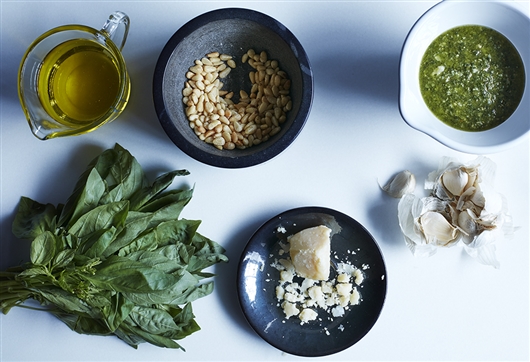Herbs really are a tonic, bringing flavour to our food and life to our homes. A few pots on a cool windowsill, a balcony or the kitchen table look and smell wonderful, and are ready to be snipped and sprinkled onto dishes to add their pungent freshness. A good friend of mine who is unwell at the moment calls it 'assembling'. When she has only enough energy to put a few ingredients together, she adds herbs to impart their intense taste and tempt her appetite - torn basil over a fresh or grilled tomato salad, dill stirred into smoked mackerel paté, or mint leaves sprinkled over mango or strawberries.
Some herbs have soothing properties, which may help to make you more comfortable when you're living with cancer. Peppermint, for example, can help to soothe an acid stomach and reduce wind and bloating. Chamomile has many therapeutic properties, including helping to calm an upset digestive system and to reduce tension (it's the valerianic acid in the leaves that encourages you to wind down).
Chamomile also contains spiro ether, a powerful antispasmodic that relaxes tense, aching muscles, making a cup of chamomile soothing when you are suffering from pain. And as Beatrix Potter famously mentioned in Peter Rabbit, chamomile tea is one of nature's best ways of encouraging children (and adults) to drop off into a deep, replenishing slumber. You can buy good chamomile tea bags, but I particularly like to use the dried flowers, available from health stores, as they taste sweeter and more apple-flavoured. Infuse 25g of dried chamomile flowers in 500ml boiling water for 10 minutes before removing them from the water. Lavender flowers can also be dried and made into a digestion-soothing tea (prepared the same way as chamomile tea) or as lavender milk - a wonderfully comforting bedtime drink.
My array of pots wouldn't be complete without rosemary, which is traditionally burnt in the homes of Greek students who are preparing to take exams, as it is renowned for improving memory and concentration. A 2017 study from Northumbria University found that people who worked in a room scented with rosemary essential oil performed better in memory tests - and I've certainly found that burning a little rosemary while I'm writing helps the words to flow faster. Alternatively, try adding a few drops of the essential oil to your morning bath or dropping them onto your sponge to revive you as you shower.
Pesto
Blitz herbs such as basil, coriander and parsley in some olive oil, to drizzle over a simple pasta, or try this simple pesto. It's fantastic with pasta or drizzled over roast potatoes. Try serving it with tomatoes and avocado in salad or slathered on toast. It can be made in a food processor or blender, or for a chunkier pesto try making it in a pestle and mortar. This recipe is a rough guide - taste as you go along and feel free to vary the quantities.
Preparation time: 5 minutes
Cooking time: 5-10 minutes
Ingredients
20g pine kernels
1/2 or 1 clove of garlic, roughly chopped
1tsp of coarse sea salt
4 large handfuls of basil (approximately 30g), washed and dried in a salad spinner or with kitchen roll
100ml of good quality olive oil
30g of Parmesan, grated
30g of pecorino, grated (or use Parmesan as an alternative)
salt and black pepper to taste
Method
Tips
If not eating immediately, pesto can be stored in an airtight container in the fridge for several days.
There are lots of variations to try with pesto. Walnuts and pistachios work well as an alternative to pine kernels. Rocket or blanched kale work as a great substitute for basil. If you are avoiding cheese, you can leave it out and add a tablespoon of fresh miso to add a more savoury richness to the recipe.
Join our Online Community to talk to other people affected by cancer
Read more on our Community News Blog
Follow Nourish, Jane's Online Community blog
Whatever cancer throws your way, we’re right there with you.
We’re here to provide physical, financial and emotional support.
© Macmillan Cancer Support 2025 © Macmillan Cancer Support, registered charity in England and Wales (261017), Scotland (SC039907) and the Isle of Man (604). Also operating in Northern Ireland. A company limited by guarantee, registered in England and Wales company number 2400969. Isle of Man company number 4694F. Registered office: 3rd Floor, Bronze Building, The Forge, 105 Sumner Street, London, SE1 9HZ. VAT no: 668265007